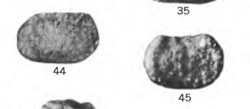Biology:Roundyella
From HandWiki
Short description: Extinct genus of seed shrimp
| Roundyella | |
|---|---|

| |
| Roundyella? simplex, R. nodomarginata | |
| Scientific classification | |
| Script error: No such module "Taxobox ranks".: | Animalia |
| Script error: No such module "Taxobox ranks".: | Arthropoda |
| Script error: No such module "Taxobox ranks".: | Ostracoda |
| Script error: No such module "Taxobox ranks".: | †Leperditellocopida |
| Script error: No such module "Taxobox ranks".: | †Scrobiculidae |
| Script error: No such module "Taxobox ranks".: | †Roundyella |
Roundyella is an extinct genus of ostracod (seed shrimp) belonging to the order Leperditellocopida and family Scrobiculidae.[1][2] Specimens have been found in beds of Devonian[3] to Triassic[4] age in Australia,[5] Asia,[6][4] Europe,[7] North America,[1] and South America.[8]
Species
- Roundyella bellatula Bradfield 1935[9]
- Roundyella dorsopapillosa Sohn 1954[10]
- Roundyella kroemmelbeini Kozur 1985[11]
- Roundyella lebaensis Krommelbein 1958[12]
- Roundyella ludbrookae Fleming 1985[5]
- Roundyella neopapillosa Ishizaki 1964[13]
- Roundyella ovatiformis Hou 1954[14]
- Roundyella papilliformis Wang 1978[15]
- Roundyella simplex Girty 1910[16]
- Roundyella simplicissima Knight 1928[17]
References
- ↑ 1.0 1.1 Sohn, I.G. (1961). "Aechminella, Amphissites, Kirkbyella, and related genera". U.S. Geological Survey Professional Paper. Professional Paper 330-B. doi:10.3133/pp330B.
- ↑ Abushik, A. F. (September 2015). "Ostracods (Crustacea): Some problems of systematics". Paleontological Journal 49 (5): 485–495. doi:10.1134/S0031030115050020.
- ↑ Ficner, F.; Havlicek, V. (1978). "Middle Devonian brachiopods from Celechovice, Moravia.". Sborník Geologických Věd, Paleontologie 21: 49–106.
- ↑ 4.0 4.1 Forel, Marie‐Béatrice; Crasquin, Sylvie; Chitnarin, Anisong; Angiolini, Lucia; Gaetani, Maurizio (May 2015). "Precocious sexual dimorphism and the Lilliput effect in Neo‐Tethyan Ostracoda (Crustacea) through the Permian–Triassic boundary". Palaeontology 58 (3): 409–454. doi:10.1111/pala.12151.
- ↑ 5.0 5.1 Ferdinando, D. (2001). Ostracode and foraminiferal taxonomy and paleoecology of the Holmwood Shale, northern Perth Basin, Western Australia [dissertation. University of Western Australia. pp. 1–326. https://api.research-repository.uwa.edu.au/ws/portalfiles/portal/3237898/Ferdinando_Darren_2001.pdf. Retrieved 14 February 2022.
- ↑ Zazzali, Sindbad; Crasquin, Sylvie; Deconinck, Jean-François; Feng, Qinglai (September 2015). "Biodiversity across the Guadalupian-Lopingian Boundary: first results on the ostracod (Crustacea) fauna, Chaotian section (Sichuan Province, South China)". Geodiversitas 37 (3): 283–313. doi:10.5252/g2015n3a1. https://hal.sorbonne-universite.fr/hal-01260450/file/g2015n3a1-hd-pdfa.pdf.
- ↑ Fohrer, B. (1997). "Ostracoden aus dem Oberkarbon und Unterperm der Karnischen Alpen (Osterreich): systematik, biostratigraphie und palokologie". Jahrbuch der Geologischen Bundesanstalt 140 (2): 99–191.
- ↑ Hoover, P.R. (1981). "Paleontology, Taphonomy, and Paleoecology of the Palmarito Formation (Permian of Venezuela)". Bulletins of American Paleontology 80 (313): 1–138.
- ↑ Crasquin-Soleau, S. (1999). "First Permian Ostracode Fauna from the Arabian Plate (Khuff Formation, Sultanate of Oman)". Micropaleontology 45 (2): 163–182. doi:10.2307/1486111. https://www.zora.uzh.ch/id/eprint/113967/1/90c%20Crasquin%20Khuff99.pdf.
- ↑ Sohn, I.G. (1954). "Ostracoda from the Permian of the Glass Mountains, Texas". U.S. Geological Survey Professional Paper. Professional Paper 264-A. doi:10.3133/pp264A.
- ↑ Mette, W. (2008). "Upper Permian and lowermost Triassic stratigraphy, facies and ostracods in NW Iran – implications for the P/T extinction event". Stratigraphy 5: 205–219.
- ↑ Olempska, E.; Blaszyk, J. (1996). "Ostracods from the Permian of Spitsbergen". Polish Polar Research 17: 3–20. https://journals.pan.pl/Content/110947/PDF/1996-1-2_003-020.pdf. Retrieved 14 February 2022.
- ↑ Ishizaki, K. (1964). "Middle Permian ostracodes from the Iwaizaki Limestone, northeast Japan". Science Reports of the Tohoku University. Second Series, Geology 36: 139–160.
- ↑ Hou, Y. T. (1954). "Some Lower Permian ostracods from western Hupeh". Acta Palaeontologica Sinica 2: 227–266.
- ↑ Yan, T. Z.; Wang, S. Q.; Qi, Y. P. (2005). "Ostracodes from the Chuanshan Formation at the Shencun section of Tonglu, Zhejiang". Acta Palaeontologica Sinica 44: 247–259. https://ci.nii.ac.jp/naid/20000758001/. Retrieved 14 February 2022.
- ↑ Sohn, I.G. (1969). "Revision of some of Girty's invertebrate fossils from the Fayetteville Shale (Mississippian) of Arkansas and Oklahoma – Ostracodes.". U.S. Geological Survey Professional Paper 606-F. doi:10.3133/pp606.
- ↑ Crasquin-Soleau, S. (1997). "First upper Paleozoic ostracodes from British Columbia (Canada): Harper Ranch Group". Palaeontographica Abteilung A 244 (1–3): 37–84. doi:10.1127/pala/244/1997/37.
Wikidata ☰ Q23766505 entry
 |
